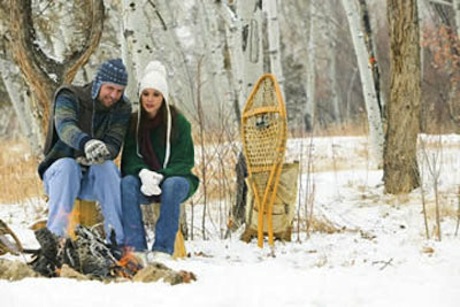(单词翻译:单击)
情景对话
Jeff: So, Tim, you live in a nice natural spot.
杰夫:蒂姆,你生活的地方有很棒的自然景点。
Tim: Yeah, that's true.
蒂姆:对,没错。
Jeff: Lots of nature around where you live?
杰夫:你生活的地方周围有很多自然景物吗?
Tim: Yeah, I'm from Oregon. There's lots of nature. There's not a lot of towns really.
蒂姆:对,我来自俄勒冈州。那里有很多自然景物。没有太多的城镇。
Jeff: And do you take advantage of it by doing any outdoor sports or activities or anything?
杰夫:那你有好好利用这些来进行户外运动或其他活动吗?
Tim: Yeah, I try to, like me and my friends, we go hiking. We camp. We backpack. Snow camp. Snowshoe. All kinds of stuff.
蒂姆:有, 我和我的朋友经常去徒步旅行。我们也会参加露营,背包旅行,滑雪露营,雪地行走等各种运动。
Jeff: Really. You snow camp?
杰夫:真的吗?你们去过滑雪露营?
Tim: Yeah, we snow camped before, yeah.
蒂姆:对,我们以前有过滑雪露营的经历。
Jeff: So do you stay out or do you stay in a cabin or?
杰夫:那你们是呆在室外还是呆在小屋里?
Tim: No, usually we go out. A lot of times it's snowshoeing and cross-country skiing. We go out and we build a little hut basically by digging down and go underneath and stay there for the night and come out. It's really cold.
蒂姆:通常我们会出去。我们经常去雪地行走和越野滑雪。我们会在室外动手搭建一个临时小屋,然后在里面住一个晚上再出来。真的非常冷。
Jeff: So, do you pull a sled behind you or do you carry your stuff?
杰夫:那你们是拉雪橇还是拿着行李?
Tim: Usually, we just put a pack on your back. Yeah.
蒂姆:基本上我们会背个背包。
Jeff: I want to try that.
杰夫:我也想试试。
Tim: Yeah, it's a lot of fun, but it's cold and usually you don't enjoy a lot of it until you done, and when you're done you think, "Ah, that was a great experience."
蒂姆:嗯,有很多乐趣,不过非常冷,可是还是很享受,结束之后你会想:那真是一次很棒的经历。
Jeff: Yeah, yeah. I think it would be good but, so is it very different from summer camping?
杰夫:对。我觉得肯定会很好,不过是不是和夏季露营有很大不同?
Tim: I think that the biggest thing is that when you go out there it's really, really silent. You don't see a lot of thing out and about because it's cold. So it's just really quiet and it's really, really peaceful.
蒂姆:我觉得最大的不同是,露营地非常非常安静。周围没有什么东西,因为实在太冷了。所以非常安静,而且非常平和。
Jeff: Is it safe? Can you die?
杰夫:那安全吗?会不会有生命危险?
Tim: Yeah, it is relatively safe. People do die doing it. For the most part it's really safe. One time we were caught in a pretty bad storm and we were coming back. The biggest thing is we came out and our car was covered in snow and we couldn't get out so that was a pretty big deal. Luckily the cellphone worked though and we were able to eventually get out but we had to dig the car out and call come people to come out and help us.
蒂姆:相对比较安全。不过确实有人在露营时死亡。大多数情况下很安全。我们曾经遇到过严重的风暴,不过我们还是平安地回家了。不过我们出来以后发现我们的车被雪盖住了,我们不能离开,这确实是很严重的事情。幸运的是,电话还能打通,所以我们找其他人帮我们把车从积雪里开出来,然后我们才得以离开。
Jeff: So do you follow a trail?
杰夫:你们会沿着痕迹开吗?
Tim: Sometimes. It just depends. Sometimes we just use navigation systems and just go out and go and pick points and go for it and sometimes we follow like ski trails that have like little diamonds on trees and you can point towards them and look for them and find them.
蒂姆:有时会。这也要视情况而定。有时我们用导航就能出去,选择地点以后按照上面的路线走就可以,有时我们会沿着滑雪痕迹前行,那就像树上的钻石一样,你可以追踪寻找这些痕迹。
Jeff: So do you recommend winter camping to people?
杰夫:你会推荐冬季露营吗?
Tim: Not unless you've had some outdoor experience. Not somebody who's just gonna go out there because you really got to look at the weather. You gotta have the right gear. If you don't have the right gear you'll freeze to death.
蒂姆:不会,除非你有户外经验。如果只是想去的话,我不会推荐,因为要考虑天气因素。而且还要有合适的装备。如果你没有合适的装备,你可能会被冻死。
Jeff: So city people, don't winter camp.
杰夫:所以,城市居民不要去参加冬季露营。
Tim: Mostly yeah. I'd say city people better not winter camp, unless you've got somebody who's really experienced with you. I've taken my girlfriend out there and so you can do it as long as you're with somebody that knows what they are doing and you have the right gear cause if you don't have something that's waterproof and things that are going to keep water out you can't do it.
蒂姆:基本上可以这么说。城市居民最好不要参加冬季露营,除非有经验丰富的人随行。我曾带我女朋友去过冬季露营,只要有了解的人陪同,有合适的装备,是可以去进行冬季露营的,但是如果你没有防水的衣服,你最好不要这么做。
Jeff: Great.
杰夫:很好。

译文属可可原创,仅供学习交流使用,未经许可请勿转载
重点讲解
重点讲解:
1. take advantage of 利用;
例句:And the industry needs to take advantage of this opportunity.
而这一产业需要充分利用这个机会。
2. be different from 与……不同;
例句:His character is very different from his wife's.
他和他妻子的性格迥然不同。
3. for the most part 大部分;多半;通常;
例句:The contributors are, for the most part, professional scientists.
投稿者大多是专业科学家。
4. to death (用于动词后)以致死亡;
例句:He almost bled to death after the bullet severed an artery.
子弹穿过动脉,他失血过多几乎性命不保。
5. as long as 只要;
例句:I do not mind,as long as you think it necessary.
只要你这个好为有必要,我不反对。


